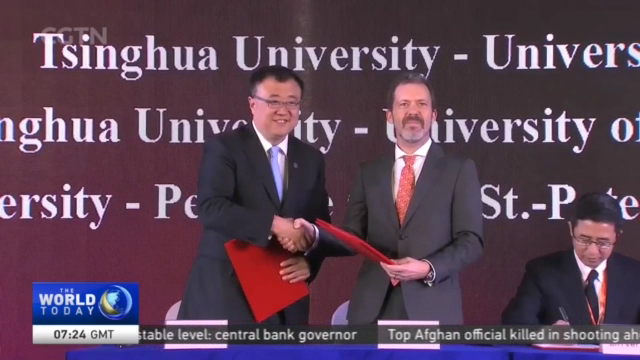
16:09, 19-Oct-2018
Academia Globalized: Tsinghua University signs strategic partnership with the Imperial and HKU
Updated
15:20, 22-Oct-2018
02:34

Freely exchanging ideas is key to the academic world. Beijing's Tsinghua University, hosting a symposium in southern China, has inked several new partnerships with international colleges. Yet their hopes for exchanges may yet be thwarted by a rising trend in some countries. CGTN's MARK FONTES explains.
A gathering of the world's top universities. The symposium in Shenzhen, hosted by Beijing's Tsinghua University, marks a turning point for one of China's top research institutions.
PROF. YANG BIN VICE PRESIDENT AND PROVOST OF TSINGHUA UNIVERSITY "In 2016, Tsinghua launched the first global strategy. Looking ahead, we hope to do more pilot studies, like more researches in Artificial Intelligence, smart cities, and intellectual manufacturing."
At the symposium, Tsinghua signed a new strategic partnership program with Imperial College London and the University of Hong Kong. They also renewed several similar programs with long-time partners like University of Alberta and University of New South Wales. The goal is to create a larger platform for scientific breakthroughs.
WANG YAN VICE DEAN OF SCIENTIFIC R&D OFFICE OF TSINGHUA UNIVERSITY "We have started many projects and the university has also set up a special fund and plan. Tsinghua and its partners have co-published essays and co-applied patents as well as organized exchange programs."
However, some at the event worry that the rising trend of isolationism in some parts of the world might restrict the potential for academic exchange.
PROF. TIM GREEN, DIRECTOR ENERGY FUTURES LAB, IMPERIAL COLLEGE LONDON "I think academics have always valued and thrived on free exchange of ideas across the world. Although the UK academic world faces a difficult challenge with leaving the EU, our university is committed to its staff to maintain flexibility and be able to recruit across Europe and the world."
Tsinghua has now formed strategic partnerships with seven overseas universities and launched projects in fields from quantum science to material science to law. The university's 2,800 international students make up about 6 percent of its student body. MARK FONTES, CGTN.

SITEMAP
Copyright © 2018 CGTN. Beijing ICP prepared NO.16065310-3
Copyright © 2018 CGTN. Beijing ICP prepared NO.16065310-3